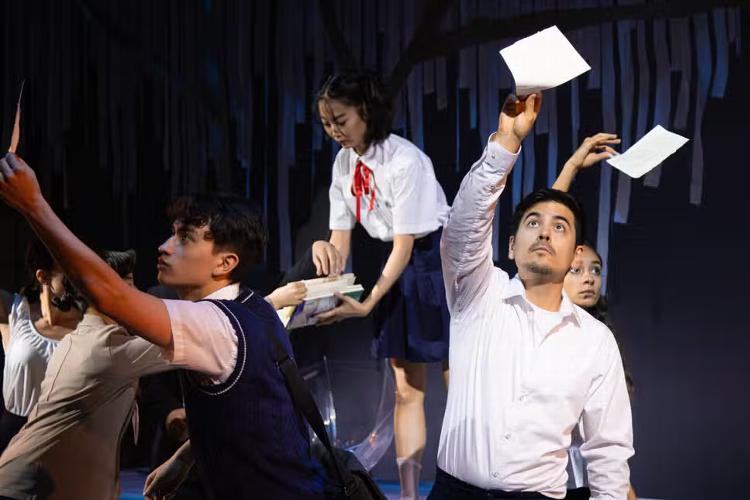From the UK’s Whole Hog Theatre ‘The Garden of Words’ is a stage adaptation of Makoto Shinkai’s 2013 Anime film, co-adapted by Susan Momoko Hingley and Alexandra Rutter and directed by Alexandra Rutter.
Anime, thanks to Studio Ghibli’s brilliant productions, has become hugely popular in the West, and at Finsbury Park's Park Theatre ‘The Garden of Words’, is one of a number of newly adapted for stage Anime stories. It’s a brilliant conceit; humans acting out what illustrated characters have already done - life imitating art, and very meta.
The ‘Garden of Words’ poses the question ‘What is it to be human’. This is played out brilliantly by the two central characters Takao Akizuki (played by Hiroki Berrecloth) and Yukari Yukino (Aki Nakagawa), who find each other in a forest taking time out from the world and their difficult lives in the city. The forest as a metaphor for escape and calm is particularly pertinent in a post-Covid era, and this production was due to open back in 2020, it holds the experience in its very DNA. The unfolding story reveals an ever-increasing need for humans to find solace in nature, the spiritual, and each other, away from the matrix.
We open to gentle music and birdsong which plays in a forest scene - beautiful set production by Cindy Lin. A huge cut-out tree (which appears to reference children’s story-book and cut collage imagery) takes up the stage and material suspended from above cut in columns like high-rise buildings blows gently about. A projection of gentle rain falling helps to create a magical environment, and then there is the poetry of the Man’yoshi which is projected at opportune moments in the forest scenes throughout the production.
Back in the city, family and work/school scenarios play out so we get a flavour of why our hero and heroine needed some escape. Difficult scenes depicting alcoholism, abandonment and sexual pressure put upon teenage girls in school all feature. Nevertheless, there is a lot of humour in the city scenes, perhaps a message that it’s not all bad, these are just the issues that humans deal with on a day-to-day basis.
As the story develops, the tension and frisson between the two main characters is palpable. Unsure of what their growing relationship is as their time together in the forest develops, they are tentative and reserved. Their connection is undoubted, and revelations to each other about their life experience are intimate. Yukari reveals ‘Before I knew what was happening, I couldn’t walk anymore’ …However both are held back by societal ideals. In the end, there is an acknowledgement and respect between them which transcends all.
The acting is superb. The most interesting parts when all the cast are together are when they are using physical theatre (movement brilliantly directed by Alexandra Rutter), the underground train commute is depicted - they move in unison squashed up together, swaying in a busy carriage. In another scene, they depict a storm, all holding a huge piece of plastic they move about which bellows just like wind with the two main characters sheltering beneath. With the backdrop of the Man’yoshi poetry projected, these scenes are particularly poignant and moving. In yet another scene, they circle another character waddling like ducks. These moments connect the piece very much to the storybook idea and Anime tradition for incorporating creatures and the other-worldly into stories.
On occasion it was tricky to follow the story, some of the switching of scenes from forest to city seemed a bit clunky and disjointed. The strength of the production was certainly in the magical moments, and I did find myself wishing there were more of these. The music played a huge part in creating this, thanks to the sound design of Nicola T Chang, and Mark Choi the composer.
It runs until 9 September.
Review: Lucinda Bennett Photo: Nick Curtis

